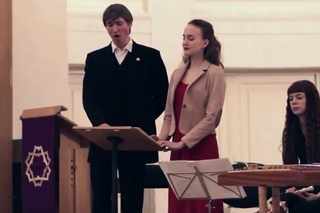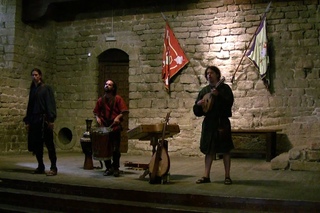Hlas Madame - French Renaissance Song
Hélas Madame is a song found in a manuscript of Henry VIII’s court. I’m calling it a “French“ song insofar as the language of it is French, although it was found in England. It was supposedly composed by Henry VIII, just like the legend of Greensleeves being attributed to him, but in both cases, they seem to be legends without much weight behind them.
As someone whose main, everyday language is French, it’s both easy and hard to understand Middle French; the chronological variety of French found in this song. I would liken it to reading Shakespeare for an English speaker: one can understand the general meaning, and it’s mostly easy to follow, but some words and spellings have changed enough to cloud some of the understanding.
The accent also plays a part: I speak Québécois French, and the many accents of Québec, much like some rural accents of France, are like fossilised forms of the Medieval pronunciation of the French language--Québécois French is closer to the Medieval French pronunciation that modern, Parisian-derived French pronunciation is. That is not to say I sang this song with my natural Québécois accent--very few people in Québec, mostly the elderly, will speak with an accent as archaic and thick as the one heard here, and this accent is very much a Late Medieval to Early Renaissance one--similar to the Québécois accent of today but still very different, all things considered. This means it’s much easier for me and my fellow Québécois to understand Middle French (pronounced correctly) than it would be for French, Belgian or Swiss person, at least those with the metropolitan accents.
A note on the instrumentation: I don’t believe the instrumentation is accurate to Henry VIII’s era, and it’s far more Medieval than Renaissance like. Though the song was performed in the 1500’s, my instrumentation has more in common with that of the 1300’s. It’s the instrumentation I felt like doing for this song, but do note that it’s not representative of Henry VIII’s era; it is however accurate enough to the Middle-Ages, from around 1200 to 1400. So consider this an Early Renaissance song arranged in the style of the Late Middle Ages--a style that the court of Jean II or Charles V would have been familiar with, in the time of the composer Guillaume de Machaut.
Lyrics in Modern French:
Hélas ma dame, celle que j’aime tant:
Souffrez que sois-je vôtre humble servant;
Vôtre humble servant, je serais toujours
Et tant que je vivrai, autre n’aimerai que vous.
Hélas, beau sire, vous êtes bel et bon,
Sage et courtois et de noble maison,
Et aussi bon que l’on saurait trouver,
Mais celui que j’aime, ne saurait oublier.
Hélas, ma dame, pensez vôtre cas:
Entre nous deux il ne faut point d’avocat.
Certes non pas, et vous le savez bien.
Allez-vous en, car vous ne faîtes rien.
Mon coeur soupire et se plaint tendrement,
Quant il ne peût trouver allegement.
Ne sachant comment on me veut chasser;
S’il est ainsi, j’irait ailleurs chasser.
Hélas, ma dame, et n’en serai-je point?
Certes beau sire, je ne le vous dis point.
Comportez a point, et vous en serez récompensé.
Hélas, ma dame, de tout mon cœur merci.
Lyrics in English:
Alas my lady, whom I do so love:
Suffer me to be your humble servant;
Your humble servant I shall always be.
And while I live, I’ll love none else but you.
Alas, fair sir, you are good and kind,
Wise and courteous and from a noble house,
And as good as one could find,
But I can’t forget the one I love.
Alas my lady, think upon your case:
Between us two, no need for advocate.
Certainly not, and you know it well.
Be gone, for you are doing nothing.
My heart sighs and tenderly complains,
When it cannot find relief.
I know not how it wants me to woo;
If it is so, I’ll go wooing elsewhere.
Alas my lady, and shall I not?
Certainly, fair sir, I have not said so.
Behave rightly and you will be rewarded.
Alas my lady, from my whole heart, thank you.






![[EXTRAIT] TURANDOT de Giacomo Puccini (“O giovinetto“ - Brian Jadge)](https://sun9-77.userapi.com/GnpN6dQZBlMIk9NXizzH1-U0tmFEGt09e-8bAg/pHX9bZmoWa8.jpg)
![[EXTRAIT] TURANDOT de Giacomo Puccini (“In questa reggia“ - Tamara Wilson)](https://sun9-38.userapi.com/s5-F2NX0V9VJilfJFCkyyVer-EUUMxk6oN-JBw/G71hLc_Y8UY.jpg)

![Le Marquis de Sade - Le Marquis de Sade (FULL ALBUM) [2023]](https://sun9-81.userapi.com/HTdfkHqx5DEs3DUGsXK0Ci4q-FY0Cq6Wc6hXXQ/TzVJSmiKXC4.jpg)











